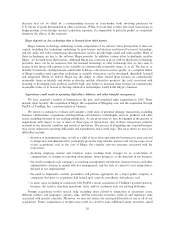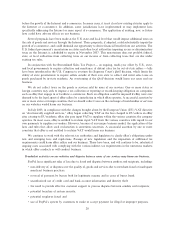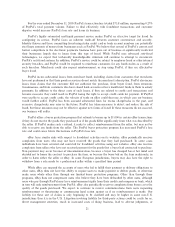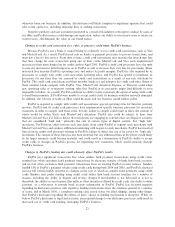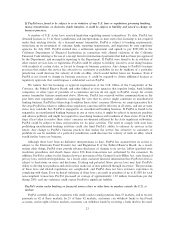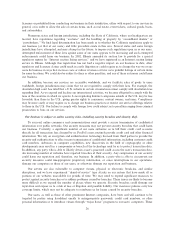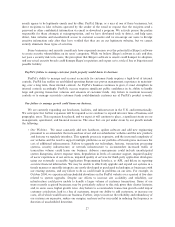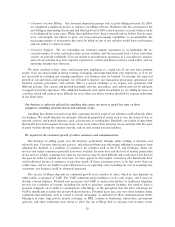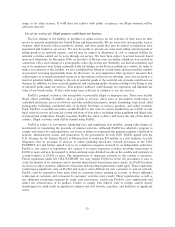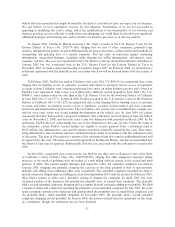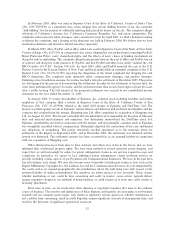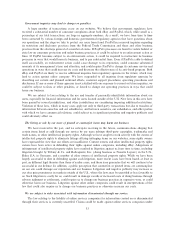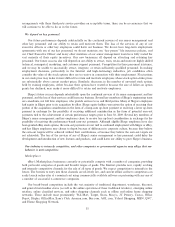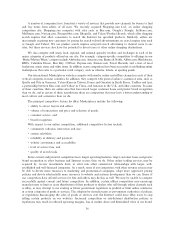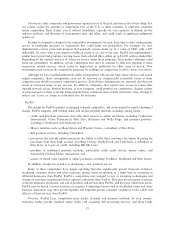eBay 2005 Annual Report Download - page 31
Download and view the complete annual report
Please find page 31 of the 2005 eBay annual report below. You can navigate through the pages in the report by either clicking on the pages listed below, or by using the keyword search tool below to find specific information within the annual report.emails appear to be legitimate emails sent by eBay, PayPal, Skype, or a user of one of those businesses, but
direct recipients to fake websites operated by the sender of the email or request that the recipient send a
password or other confidential information via email or download a program. We actively pursue the parties
responsible for these attempts at misappropriation, and we have developed tools to detect, and help users
detect, fake websites and unauthorized access to customer accounts and we encourage our users to divulge
sensitive information only after they have verified that they are on our legitimate websites, but we cannot
entirely eliminate these types of activities.
Some businesses and security consultants have expressed concern over the potential for Skype's software
to create security vulnerabilities on its users' computers. While we believe Skype's software is safe and does
not pose a security risk to its users, the perception that Skype's software is unsafe could hamper its adoption,
and any actual security breach could damage Skype's reputation and expose us to a risk of loss or litigation and
possible liability.
PayPal's failure to manage customer funds properly would harm its business.
PayPal's ability to manage and account accurately for customer funds requires a high level of internal
controls. PayPal has neither an established operating history nor proven management experience in maintain-
ing, over a long term, these internal controls. As PayPal's business continues to grow, it must strengthen its
internal controls accordingly. PayPal's success requires significant public confidence in its ability to handle
large and growing transaction volumes and amounts of customer funds. Any failure to maintain necessary
controls or to manage accurately customer funds could diminish customer use of PayPal's product severely.
Our failure to manage growth could harm our business.
We are currently expanding our headcount, facilities, and infrastructure in the U.S. and internationally.
We anticipate that further expansion will be required as we continue to expand into new lines of business and
geographic areas. This expansion has placed, and we expect it will continue to place, a significant strain on our
management, operational, and financial resources. The areas that are put under strain by our growth include
the following:
‚Our Websites. We must constantly add new hardware, update software and add new engineering
personnel to accommodate the increased use of our and our subsidiaries' websites and the new products
and features we regularly introduce. This upgrade process is expensive, and the increased complexity of
our websites and the need to support multiple platforms as our portfolio of brands grows increases the
cost of additional enhancements. Failure to upgrade our technology, features, transaction processing
systems, security infrastructure, or network infrastructure to accommodate increased traffic or
transaction volume could harm our business. Adverse consequences could include unanticipated
system disruptions, slower response times, degradation in levels of customer support, impaired quality
of users' experiences of our services, impaired quality of services for third-party application developers
using our externally accessible Application Programming Interface, or API, and delays in reporting
accurate financial information. We may be unable to effectively upgrade and expand our systems in a
timely manner or smoothly integrate any newly developed or purchased technologies or businesses with
our existing systems, and any failure to do so could result in problems on our sites. For example, in
October 2004, we experienced unscheduled downtime on the PayPal website over a period of five days
related to system upgrades. Despite our efforts to increase site scalability and reliability, our
infrastructure could prove unable to handle a larger volume of customer transactions. Some of our
more recently acquired businesses may be particularly subject to this risk given their shorter histories
and, in some cases, higher growth rates. Any failure to accommodate transaction growth could impair
customer satisfaction, lead to a loss of customers, impair our ability to add customers, or increase our
costs, all of which would harm our business. Further, steps to increase the reliability and redundancy of
our systems are expensive, reduce our margins, and may not be successful in reducing the frequency or
duration of unscheduled downtime.
27



